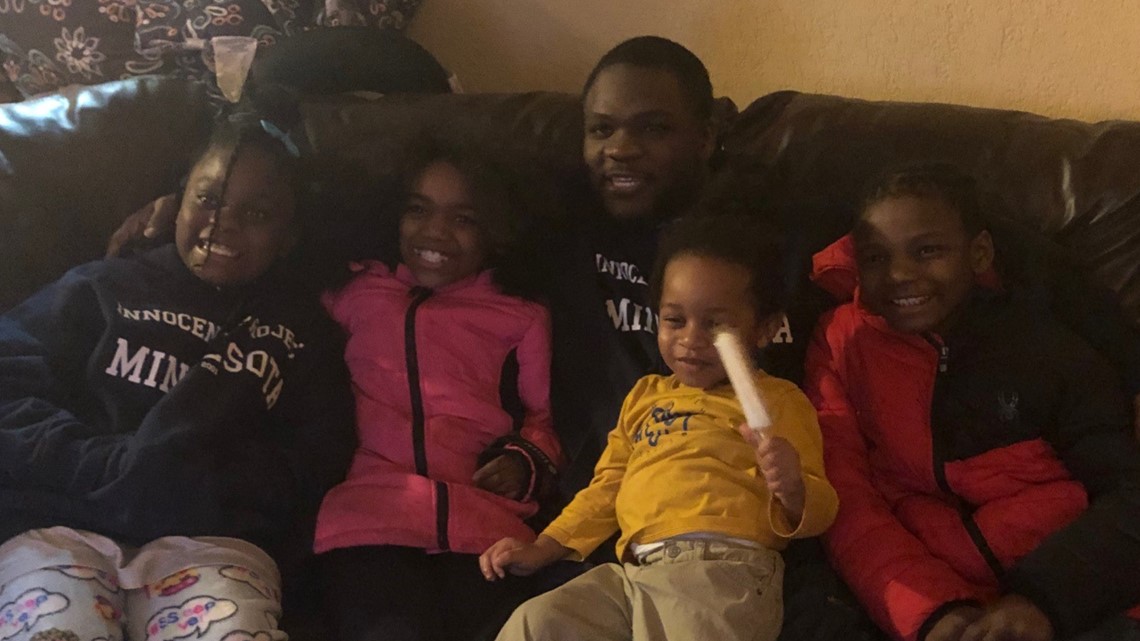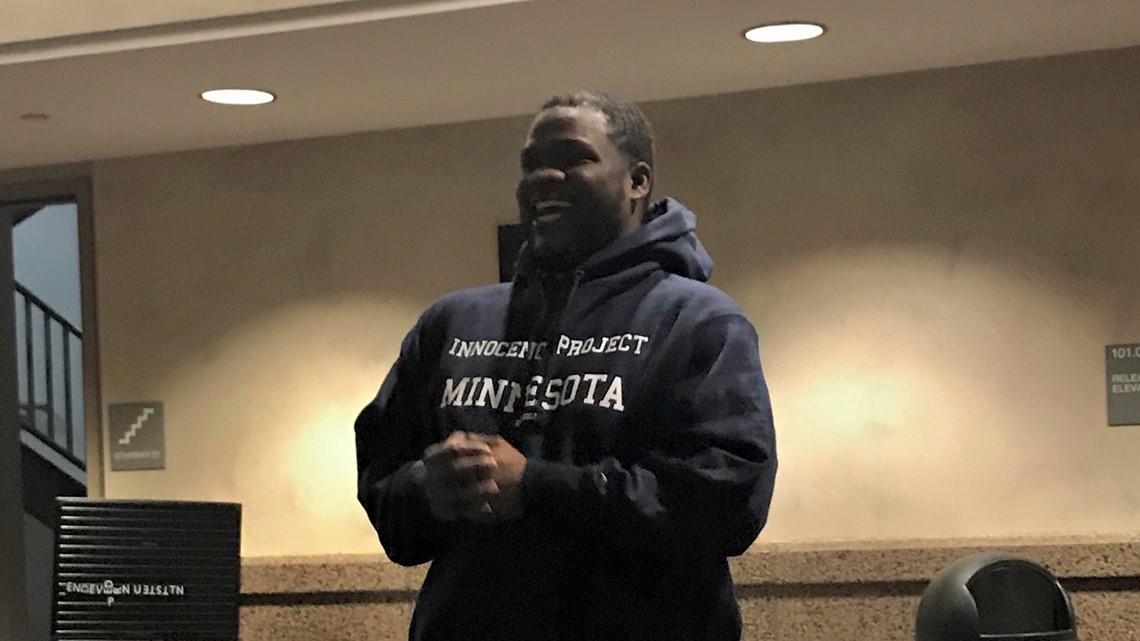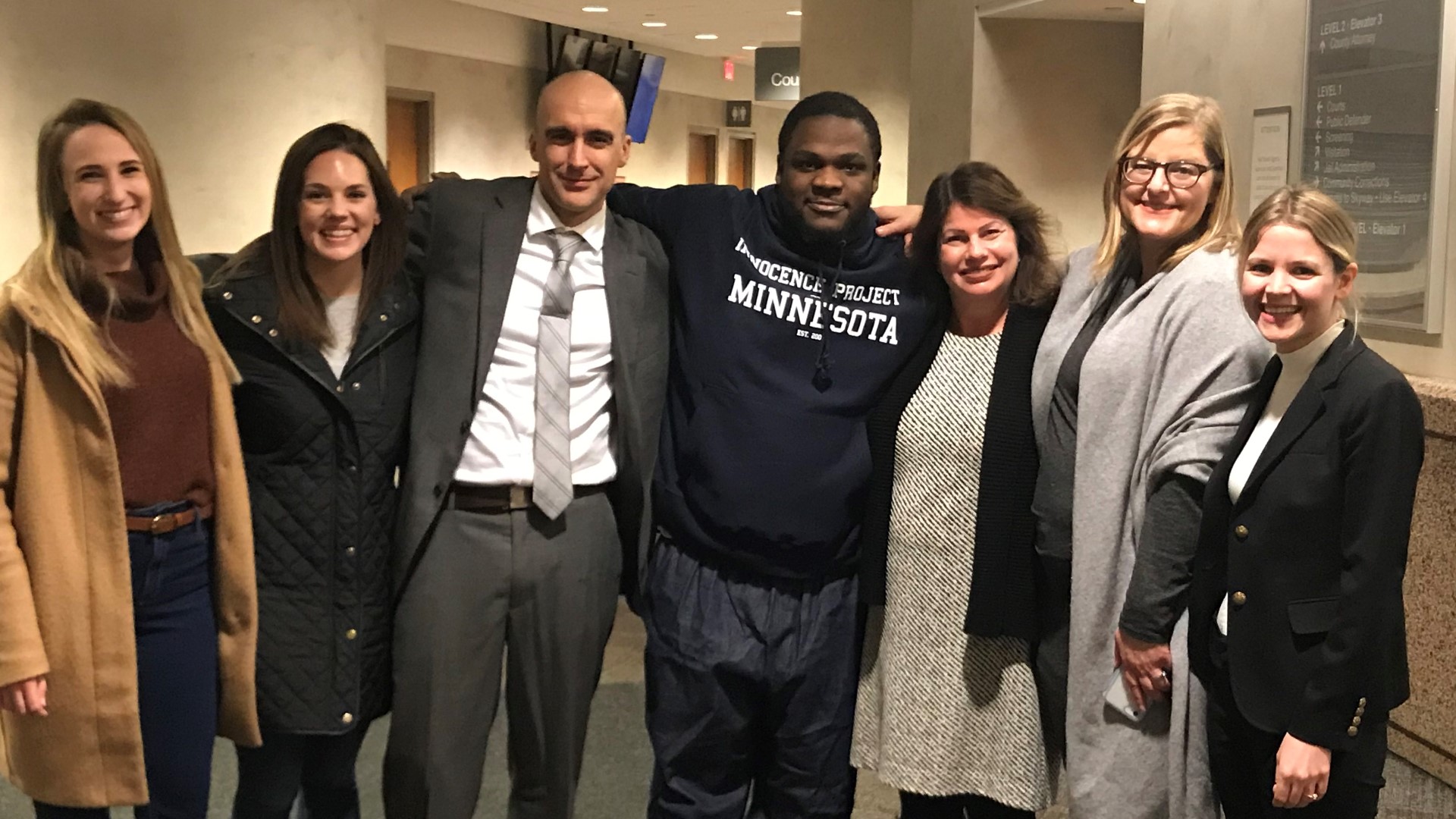For Javon Davis, the worst parts of being in prison were waking up and going to sleep.
Because he knew he wasn’t supposed to wake up there. And he knew he wasn’t supposed to go to sleep there.
“That was the hardest time, because all I could think about is, ‘Why am I in prison?” Davis said.
“Every day you’ve got to imagine waking up and you’re in jail, going to sleep, you're in jail. You lose family members, you lose everything. You don't get to see your kids. You don't get to see your family. You don't get to live life.”
Javon said he wrestled with not being able to be there for the people he loved.
“It makes you question everything,” he said. “Question God. Question humans.”
And that one thought he could never shake: “I’m not even supposed to be in prison.”
The Target Field shooting
The “why” behind Davis’ nearly six years in prison began early the morning of April 12, 2014. Two men were shot near Target Field, and police found them lying near the gates. One would end up paralyzed.
Neither of the victims could identify the shooter. Witnesses saw three men, but they were wearing hooded sweatshirts and it was dark. Police started interviewing people, and they zeroed in on Javon Davis. They believed he was in a gang-related “tit for tat” with one of the people who was shot.
Javon said he was so surprised to be implicated that he called the police to ask why they were looking for him. He was arrested and charged with attempted murder for the benefit of a gang.
Hennepin County Attorney Mike Freeman framed the case as a win in the fight against gang violence, saying at a news conference that it was “mindless street violence.”
“It impacts not only the people they shoot, but the public that is exposed to it,” he said.
“I never thought that I was really going to go to prison because I was like, ‘I don't have anything to do with it. They're going to have to see that,’” Javon said. “I'm like, no, I can't go to prison for something I didn't do. I never knew this was possible until it happened to me.”
Javon turned down a plea deal early on, before trial. He had an alibi - cell phone records showing his exact location, 20 minutes away at the exact moment of the shooting. He said he was headed to Flameburger with some friends. He thought that had to be enough.
He said his defense attorney, Mike Padden, told him the state’s case against him was weak.
Javon’s alibi may not have been as strong as Padden thought it was. The state showed that Javon had listed a different cell phone number as his personal number - earlier that year. The state argued that the phone was a gang business phone, and was used to construct an alibi.
Even so, Javon says he had no thoughts about going to prison – until he was minutes away from being found guilty. On the day of the verdict, a juror who had nodded to him every morning was suddenly avoiding eye contact.
“So I looked over at Mike Padden and I said, ‘They're going to find me guilty,’” Javon recalled. “He was like, ‘Just be positive.’ And I tried to be positive for the next five minutes, but I knew. That's the only time I ever knew or I felt like, ‘I’m about to go to prison.’”
And he did. Javon Davis was found guilty of two counts of attempted murder. His sentence was 28 years. He would spend six of those behind bars before a judge would overturn his conviction - and set him free.
The trial
Judge Paul Scoggin, who eventually overturned Davis’ conviction, identified three major problems with his trial. Scoggin called them “critical shortcomings.” Though two of the three issues were initiated by the prosecution, the judge blamed Javon’s defense attorney, Mike Padden, for not objecting.
Padden declined an interview request for this story.
Here are the three main problems, documented in court records over years of appeals.
First there’s Kibbie Walker, one of the men who was shot. He told police right after the shooting that he couldn’t see who shot him. Two days later, he told police during an hour-long interview that it was Javon. Then at the trial, on the stand, he recanted. He said he’d only told police that because he heard it from other people. It was hearsay. He maintained that he couldn’t identify his shooter – and he didn’t want to send an innocent man to prison.
But prosecutors wanted to play the video of that police interview with Kibbie Walker for the jury, and Javon’s defense attorney did not object. The video was very persuasive, but Scoggin later ruled the jury never should have seen it.
In fact, the video was so out of bounds that the trial judge actually pulled both attorneys aside after the jury saw it and told them that the video contained “all kinds of things, like leading questions, speculation, conclusions, hearsay … but nothing was objected to so there was nothing for me to rule on. … OK?”
Not only did Javon’s defense attorney not object, he later admitted he hadn’t watched the video. He had just read the transcript.
The second “critical shortcoming” in the trial came in when prosecutors asked the judge to let them use evidence of Javon’s past bad behavior. Law enforcement suspected Javon was involved in a shooting back in 2010 – also involving Kibbie Walker. Someone shot at Walker near Bde Maka Ska. Prosecutors thought this would show that Javon had been targeting Walker.
Javon was never convicted in that shooting, but prosecutors told the judge they had three witnesses. So the judge decided to allow it.
But at trial, two witnesses did not appear, and another had recanted. The prosecution only had a police sergeant, and one woman who said she got a glimpse of the shooter. But she didn’t identify him until two years later, when she saw Javon in a photo lineup. When she identified him, police notes indicate she thought his nose was familiar. But she admitted some of the men in the lineup looked similar.
Even though the prosecution had considerably less evidence about the Bde Maka Ska shooting than they’d promised, Javon’s defense attorney did not object. That same judge later said that what the state brought up as evidence was “not even close” to what they’d promised.
While Javon wasn’t convicted of that shooting, he does have a criminal record. His past convictions include assault, drug possession, and interfering with a 911 call. He hasn’t had a new conviction on his record since 2014.
The third major issue in Javon’s trial had to do with his alibi, which included the fact that he was with a man named Justin McGee. McGee was originally charged in the shooting outside Target Field. Police believed he was one of the three people in the hooded sweatshirts. But the charges against him were dropped. And then, he got on the stand and attacked Javon’s alibi, saying Javon was not with them at Flame Burger.
Javon’s attorney had two witnesses who were both ready to testify that McGee told them he was planning to lie about Javon to save himself. Those two women were on the witness list, but they were never called to the stand.
Appeal after appeal
Javon started fighting his conviction right after the verdict came down.
First, his defense attorney filed a motion for acquittal, which was denied. Then, Javon was assigned an appellate attorney who filed a direct appeal. She brought up several arguments, but did not use the one that would eventually work: ineffective counsel.
That appeal was denied, and the state supreme court declined to review it in August of 2016. That was the end of Javon’s free legal help. Once a person is convicted, they lose many constitutional rights, including their right to an attorney.
RELATED: New research shows prosecutors often fight winning innocence claims, offer deals to keep convictions
“I was just looking in the mirror every morning, like, ‘I'm gonna be here till 2033, sitting in here for something I didn't do,’” Javon said.
2033 is when Javon would have been eligible for parole.
Javon filed a post-conviction petition “pro se.” That means without an attorney. He submitted it in September of 2017.
Javon himself was actually the first person to argue that he’d had ineffective counsel, but the judge denied him because he could have brought that up on direct appeal – and didn’t.
“After that direct appeal is finished, then you really need something new,” Julie Jonas with the Great North Innocence Project explained. “There's a lot of procedural hurdles that say you can't raise things that were known about at the time of trial or appeal and be successful in post conviction. You need to develop new evidence.”
When Javon’s petition was denied in March of 2018, he had been locked up almost four years.
He didn’t give up, partially because he already had another reason to hope. He had written to the Great North Innocence Project and told them about his case.
The Innocence Project
The Great North Innocence Project in Minnesota is one of several innocence projects around the country - nonprofits that give free legal help to people they believe are wrongfully convicted. These organizations generally only take cases where they believe the person is completely innocent of the crime.
“I started writing them, I’d be like, ‘Man, I fit the criteria,’” Javon said. “‘I am innocent-project innocent.’ Like, ‘That's me. That's me. That’s me.’”
At this point, Javon had been telling people he was innocent for years. He told his corrections officers, referred to as COs, every day. Nothing had changed.


One day, Javon was given a pass to see his lawyer. The strange part was he didn’t have a lawyer anymore. It turned out to be the Great North Innocence Project. Julie Jonas had gotten his letter and was struck by his case. She had sent two law students to interview him.
He had been saying it for years, but in two hours with those law students, he said it again. “I’m innocent.” And this time – something different happened.
“They believed in me. They came and visited me. We talked. They looked me in my eyes. We were 100% true with each other and they believed me,” Javon said. “It’s hard to get people to believe in you, especially in the criminal justice world or whatever we go through. It's really hard to get people to believe you. Like, I didn't do this. No matter what you think about me or you think who I am. I'm not that person. And I did not do this.”
The Innocence Project took on Javon’s case. In November 2018, they filed a second post-conviction petition. They once again made an argument that Javon had ineffective counsel in the trial. But this time they added that his appellate attorney was ineffective as well, for not bringing it up when she had the chance.
Hennepin County prosecutors continued to fight Javon’s appeals.
In March and April of 2019, Julie and two other innocence project attorneys, Jim Mayer and Jon Hopeman, presented their case before the judge. Hennepin County prosecutors presented theirs.
Then, they waited. But five months later - the judge had a heart attack. He went on medical leave in September 2019.
The whole case was stalled again. It was reassigned to Judge Paul Scoggin in October, but he had a lot of catching up to do. Finally in December, they had to have another hearing and present their oral arguments again.
Then Javon waited again. He had been in prison more than five years. And he was looking at nearly 23 more - or 14 until he’d be eligible for parole
“We wasn’t gonna stop fighting if the decision wasn’t that,” he said. “But it was, I was at dark spots. That’s what I can say, I was at dark spots. 2033 was long. It was long. I didn't know if I was going to be there. So that's how frustrating some dark nights I had.”
Javon said he remembers telling Julie and the other attorneys that he didn’t know what he was going to do if the appeal didn’t work.
“And their main thing would be, ‘We’re gonna keep fighting,’” he said. “‘We’re gonna get you out of prison. We know you’re innocent. We’re gonna get you out of prison. We’re not gonna stop trying.’ And they didn’t.”
The ruling
It took three months for Judge Paul Scoggin to go through the case and come to a decision.
Javon’s lawyers had told him to call them at 5 p.m. on March 2, 2020, in hopes that a ruling would have come down. When they picked up, they started reading the judge’s brief to him.
“I'm clinging on to every word,” Javon said. “My heart is beating so fast. I don't know what she’s going to say, then she says, ‘Therefore it is vacated.’ And that's the only word I heard. I just started screaming.”
He wasn’t the only one.
“Instantly the whole unit, everybody, all the COs is jumping up like ‘Davis, are you serious?’ I'm like, ‘Yeah, I think,’” Javon said. “We’re just screaming and we’re just so happy and ecstatic. And I just cannot breathe. I just had to keep sitting down and everybody's around me, even the COs was like clapping, the whole unit is clapping. Because like, you don't see it, you don't see it happen. So they were like, wow.”


The judge’s ruling was 142 pages long, and it vacated Javon’s convictions based on ineffective counsel. The judge said if Javon’s defense attorneys had not made the mistakes they did - the verdict probably would have been different. Scoggin wrote that those three problems were “failures” that “infected the entire trial, allowing the State to present what proved to be a ‘thin’ case against Davis based largely on inadmissible but damaging evidence.”
Javon spent one more day in prison after that ruling came down. He said the COs kept coming by to talk to him.
“And all they kept coming by my room and saying was like, ‘Davis, you always said you were innocent,’” he said.
Javon said one CO came in that day when he wasn’t even on the schedule.
“He was like, ‘I worked today just to see you leave,’” Javon remembered.
Javon had to wait for prosecutors to respond to the judge’s order. They could have decided to try him again, though the data suggests this is uncommon. Instead on March 18, 2020, Mike Freeman issued a one-sentence filing dismissing the charges “in the interest of justice.”
Javon walked out of custody that very day - a free man.
Public humiliation, private apology
March 18, 2020 wasn’t just the day Javon Davis got out of prison. As he describes it, it was the day COVID-19 shut the world down.
A wrongful conviction might have been a high-profile news story on another day, but not when a global pandemic was taking over headlines.
The Star Tribune ran a story, showing an enthusiastic and grateful Javon Davis getting out of state custody. They reported that Hennepin County Attorney Mike Freeman declined to comment.
Javon said he wishes Freeman would publicly apologize and let people know he didn’t commit the crime he was accused of.
“When I went to prison, they sure did let people know that I was some guy that shot people, some gangbanger that shot people and all this and that, so I feel like that's like publicly humiliating someone and apologizing in private,” he said. “You humiliated me in the public, say sorry in public.”
But Javon is not likely to get that apology anytime soon. In a response to a recent request for compensation for his years in prison, Freeman’s office stated that they still believe Javon is guilty. They just don’t have the evidence to retry him.
‘A chance to be great’
Javon said on top of the obvious things that prison time took from him, like relationships and income, there’s something that’s hard to put his finger on. That’s because he doesn’t know exactly what was taken from him. It’s more the lack of something.
Javon defines it as the chance for greatness.
“That six-year gap, being able to see what I would have become, whether good, bad or nothing, I didn't have the opportunity because it was taken from me for nothing,” Javon said. “So I didn't get an opportunity to see what, that whole six-year gap, what I would have been at 26. Half my 20s I lost for something I didn't do. And I didn't get to see how great - they didn't let me be great. They didn't let me get a chance to be great or anything.”
Javon said he still has big dreams. One of them is to open a community center for kids in Minneapolis. He said his most important childhood relationships came through sports - and he wants to give that to other kids who may be headed down the wrong path.
“That’s my biggest dream,” he said. “If I was a millionaire right now, I would spend every quarter right now. They gave me a million dollars, I would give it to make this possible. I don't need any money. If I could have that, I don’t need any money. I promise. That's my biggest dream.”

